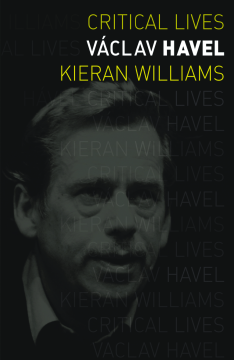
Additional Information
Book Details
Abstract
Václav Havel claimed to want a quiet life dedicated to writing, but he lived exactly the opposite: as the most famous dissident—via his poetry, plays, and essays—in Czechoslovakia under Communist rule. This biography is the first to pay close attention to Havel’s beginnings as a poet, placing his later, more famous works in the context of his poetical beginnings. In doing so, Kieran Williams sheds new light on Havel’s formative years and the stylistic and philosophical influences that would come to shape one of the most famous Czech writers—and political leaders—of the twentieth century.
Williams connects the plays for which Havel is best known to his earlier poetry as well as to his development as a writer of profound insight on the arts, his country’s social and political turmoil, and the modern condition at large. He also contextualizes Havel’s oeuvre within his dramatic private life and his ambivalence about being the scion of a patriotic and cosmopolitan Prague family. Reading Havel’s works in Czech alongside his voluminous correspondence, Williams produces a full, rounded picture of a figure of extraordinary artistic and political courage beset with inner paradoxes.
“Williams has produced a vivid portrait of Havel as both human being and engaged intellectual. With a series of invaluable chapters tracing Havel’s intellectual development from childhood to old age, the book offers a biography of its subject like no other piece of scholarship has given us.”—David Danaher, University of Wisconsin–Madison
— David Danaher, University of Wisconsin–Madison
“Václav Havel: dramatist, dissident, politician, prisoner, president, lover—but if you want to know Havel the writer, this is the Life for you. No other biographer has covered his output so thoroughly—and since most of Havel’s work is still untranslated, Williams has done us all a fantastic service. I suspect he’s read every item in the sturdy green volumes whose publication was overseen by Havel himself, and selected not just the famous essays but a kaleidoscope of poems, reviews, letters, criticisms, plays, speeches . . . documentation vividly evoking those ‘interesting times’ when Havel played a major role in transforming Europe.”
— Barbara Day, author of "The Velvet Philosophers"
“Havel’s life shows him wrestling to match art with civic responsibility. During and after communism, in adversity and triumph, the task almost overwhelmed him. What Williams shows, quietly and movingly, is how this not so distinguished poet, this enthusiastic reader of books on philosophy and the occult, kept working for social and political improvement, not for glory, but to put his soul in order. . . . Williams, a linguistic insider, has sharp observations to make on the texts, while eschewing judgement on the quality of the artistic oeuvre.”
— Times Literary Supplement
“Williams’s biography of Václav Havel is less a conventional narrative of his life and influence, though it does touch on all the key moments, than a search for the deeper forces which gave rise to his thought and actions. Williams sees Havel as a figure who was always consumed by a poetic instinct to unsettle and disturb, to continually force others to step outside of their ordinary routines. . . . The sheer wealth of information and immersion in primary sources make this book an essential companion for any scholar who wishes to take Havel seriously as a thinker, artist, and political actor.”
— Slavonic and East European Review
“Informed by a range of sources in both Czech and English, Václav Havel is a highly readable, intelligent, and insightful study of one of the most prominent intellectuals and politicians in modern Czech history.”
— Journal of European Studies
“For Havel, politics was applied morality, yet his plays depicted a world without values, concludes Williams. His biography is a clear, concise, and persuasive account of the life, work, and achievements of a major European personality whose impact, with all its problematic aspects, has helped to shape the twentieth century.”
— Slavonica
“[An] impressive biography. . . . Williams is at his best offering thoughtful, detailed analyses of Havel’s published and unpublished works, teasing out influences and themes across times. . . . Williams’s book, while clear-eyed about his subject’s imperfections, remains a sustained and successful effort to demand that we remember Havel’s attempt to live as he wrote. The biography also demands that we remember Havel as a poet and essayist first, and as a dissident turned president second. . . . Williams’s biography neatly combines a tight, lucid overview of an important subject with well-considered analysis. . . . A remarkable feat.”
— Journal of Modern History
Kieran Williams is adjunct professor of political science at Drake University in Iowa. He is the author of The Prague Spring and its Aftermath.
Table of Contents
| Section Title | Page | Action | Price |
|---|---|---|---|
| Cover | Cover | ||
| Václav Havel | 3 | ||
| Imprint Page | 4 | ||
| Contents | 5 | ||
| Note on the Text | 7 | ||
| Introduction | 9 | ||
| 1. ‘Every Soul is a Certain Architecture’ (1936–52) | 16 | ||
| 2. Poetry’s False Start (1952–7) | 41 | ||
| 3. Into Theatre and Političnost (1957–69) | 65 | ||
| 4. To Hrádeček and Dissent (1970–79) | 100 | ||
| 5. From Trial to Castle (1979–89) | 130 | ||
| 6. The Presidential Great Work (1990–2003) | 164 | ||
| 7. Exiting (2003–11) | 184 | ||
| References | 201 | ||
| Select Bibliography | 227 | ||
| Acknowledgements | 235 | ||
| Photo Acknowledgements | 237 |
